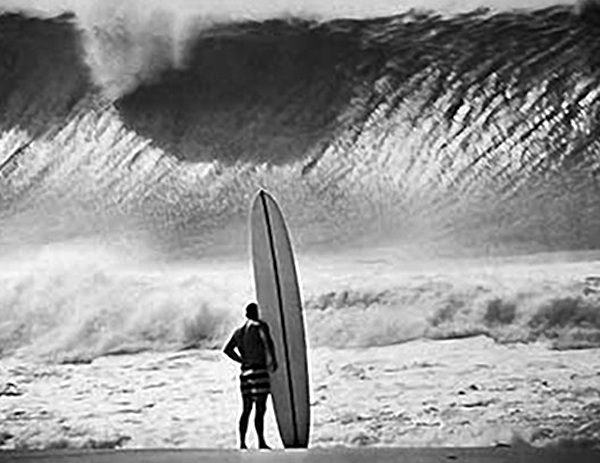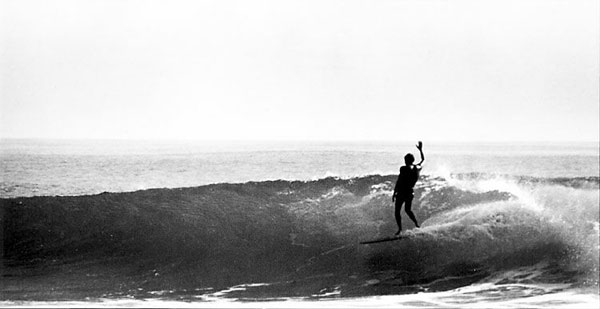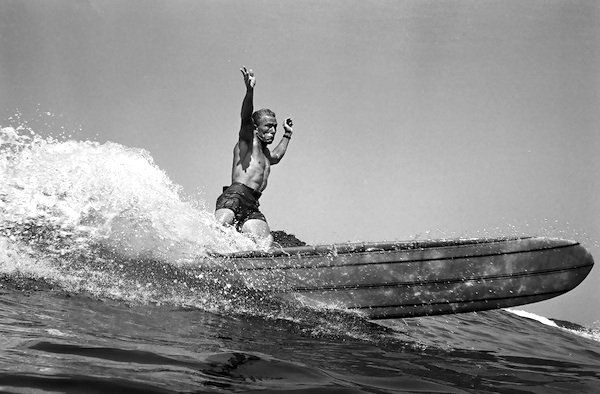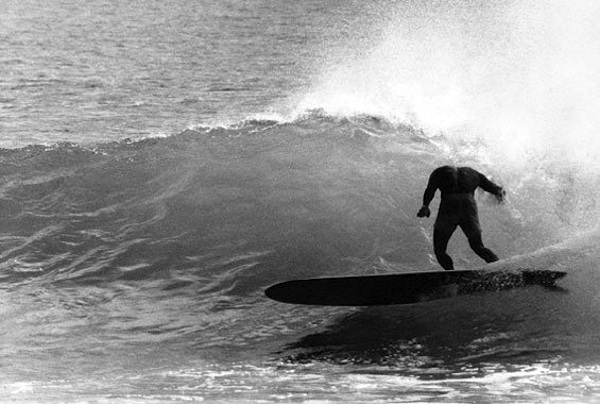In our modern multimedia world we are bombarded by images of surfing, marketing anything from beers to the BBC.
To pay homage to the heroes of this once treasured art, I present to you the pioneers and legends of surf photography:
John Severson
John Severson is THE surf photography legend. His photos of Greg Noll ‘Da Bull’ (above), Gerry Lopez, Van Dyke, Mickey Munoz, and more – helped make surfing and surfers famous.
John Severson also created one of the first and by far the most successful surf magazines ‘Surfer’. If top draw surf photography and magazine production wasn’t enough, John Severson also produced a string of popular surf movies, including Surf Safari, Surf Fever, Pacific Vibrations and Big Wednesday.
Did I mention John Severson was a big wave hell man? In 1961, he won the Peru International Surfing Championships and made the finals in the U.S. and Hawaiian Championships.
For his surfing achievements Severson has received many well-deserved accolades. They include a place in the Surfing Hall of Fame and the Walk of Fame at Huntington Beach. He was also awarded the Waterman of the Year by the Surf Industry Manufacturers’ Association in 1997.
John Severson’s eye behind the lens, mind on the magazine and body on the board have contributed more to the culture and history of surfing than perhaps any other surfer.
Find out more at Surfer Art.
Ron Stoner
Ron Stoner was considered the best surf photographer of the mid-sixties. A time when surfing culture, surf magazines and movies began to explode in popularity. He gathered a glorious gallery of bikini babes, breath-taking beaches and mouth-watering waves, transcending Severson’s “Surfer” Magazine beyond the US borders.
During 1966/67, aged just 23, Stoner was at the zenith of his career. His images of magical wave-riding in an unspoilt California caressed the covers of practically every issue of ‘Surfer’. However these were the days of LSD, and Stoner took to them with unhealthy enthusiasm. With an ever increasing usage, Stoner’s mental health deteriorated rapidly.
In the spring of 1968 Stoner met with Severson at Surfer, and could only communicate by quoting the bible. Severson, concerned for his young staff photographer drove him to a local hospital. Ron was diagnosed with schizophrenia. Padded cells, straight jackets and electro-shock treatment followed – Stoner was changed forever.
Ron Stoner was filed as a missing person in 1977. In 1996 he was declared dead, although a body has never been found.
Find out more at Tantramar.
LeRoy Grannis
Leroy ‘Granny’ Granis was born in 1917, Hermosa Beach. He started surfing when boards were literally planks of wood, so it wasn’t until aged 14 that Granny mustered the strength to carry a board to the beach.
Curiously Granny didn’t pick up a camera until he was 42 in 1959. He took up surf photography at the suggestion of his doctor. He had developed an ulcer from a stressful job, so it was thought this hobby would take Granny’s mind off things.
With a hand-built waterproof housing for his camera Granny jumped right in. His work soon appeared in surf magazines including Surfer, Reef and Surfing Illustrated. Granny quickly became one of surfing’s most important media men. He gained the position of photo editor at Surfing Illustrated and International Surfing, which he co-founded.
Find out on Wikipedia.
Or buy his book on Amazon.
John Witzig
Severson, Stoner and Grannis created the foundations of surf art, media and culture in the U.S and Hawaii. But on the other side of the planet John Witzig was setting the scene for Australian surf culture.
John Witzig’s images of unridden waves and the rising stars of surfing, such as Nat Young, Bob McTavish, Wayne Lynch and Michael Peterson became the first pages in the book of Australian surfing.
Witzig was also a surf writer and became the founding editor of Surf International and co-founder of Tracks. Witzig has produced some memorable mutterings in other publications as well, notably in 1966 with his provocative article ‘We’re Tops Now!’ for Seversons’ ‘Surfer’ – announcing Australia’s dominance in surf competition.
Witzig’s photos of the sixties surf scene have now become collectible art, exhibited in galleries and sought after around the world.
For more info visit the John Witzig website.



